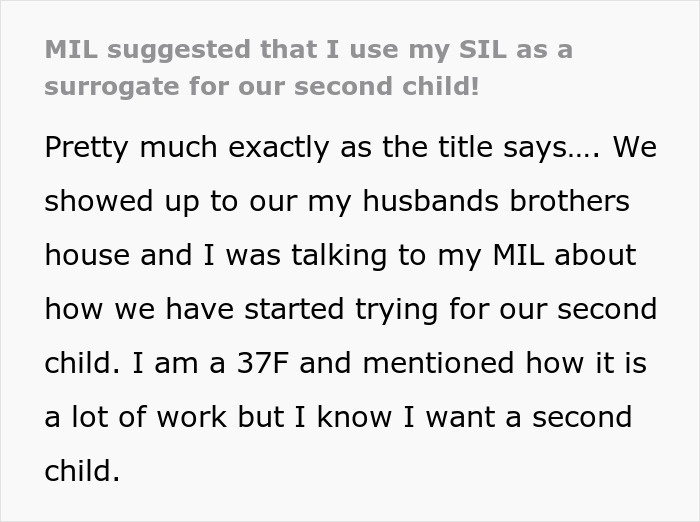Breaking the news to your family about plans to have children is meant to be an exciting and joyful moment. But for one Redditor, it turned into a bizarre conversation she didn’t see coming.
When she told her mother-in-law about trying for a second baby, she didn’t get the congratulations she expected. Instead, her MIL floated a jaw-dropping idea: her sister-in-law could become a surrogate and carry it for her.
And as outrageous as that was, what followed made things even weirder. Keep reading for the full story.
When the woman told her MIL she was trying for a second baby, she didn’t get a congratulations

Image credits: Xavier Mouton Photographie / unsplash (not the actual photo)
Instead, her MIL proposed something shocking: her SIL could carry the baby for her




Image credits: Image-Source / envato (not the actual photo)

Image credits: JessiRabbit18
Tensions with in-laws tend to impact women the most

Image credits: Ave Calvar / unsplash (not the actual photo)
Though the disagreement in this story might seem unconventional, it’s a situation many married women can relate to—having a complicated relationship with their mother-in-law.
Terri Apter, a psychologist and senior tutor at Newnham College, Cambridge University, spent over two decades researching these family dynamics. In her 2008 book, she revealed that 60% of women admitted their relationship with their mother-in-law caused them significant stress and unhappiness. Two-thirds of daughters-in-law even felt that their mother-in-law often displayed jealous, maternal behavior toward their sons.
“Mother-in-law and daughter-in-law conflict often emerges from an expectation that each is criticising or undermining the other, but this mutual unease may have less to do with actual attitudes and far more to do with persistent female norms that few of us manage to shake off completely,” Apter explained.
For example, while a daughter-in-law may feel she’s running her own household, a mother-in-law might expect to share her “expert advice” or influence. “There then arises that tricky question about who is ‘mother’ in the family, with final say over all those things women still assume charge over: housework and child care, meal times and children’s manners,” Apted said.
It’s important to set boundaries with your mother-in-law, expert advises

Image credits: Getty Images / unsplash (not the actual photo)
So, how can daughters-in-law handle this better? Leslyn Kantner, a licensed therapist and family coach, suggests approaching the mother-in-law relationship with compassion rather than competition.
At the same time, she advises setting clear boundaries early on so that everyone is on the same page about the level of involvement. Without those boundaries, agreeing to everything a mother-in-law says can set a pattern where the daughter-in-law feels pressured to say yes every time.
Moreover, it’s not solely the daughter-in-law’s responsibility to manage communication with the mother-in-law. The partner should step in to share the responsibility and show they’re approaching things together as a team.
“When you’re married, you and [your] partner need to talk about what you want for your family and communicate that to both sets of parents as a unit,” said Kantner.
“Men have a tendency not to want to disappoint their mothers, so leave the burden of communications to their wife. When they have to say no, it sets her up to be the bad guy,” she noted. “Communicating together to both parents says, ‘We love you guys but we’re a family now and we’re going to do this.’”
In the replies, the woman explained that her MIL is simply socially clueless





Meanwhile, commenters couldn’t hide their shock and disbelief over the entire situation




















